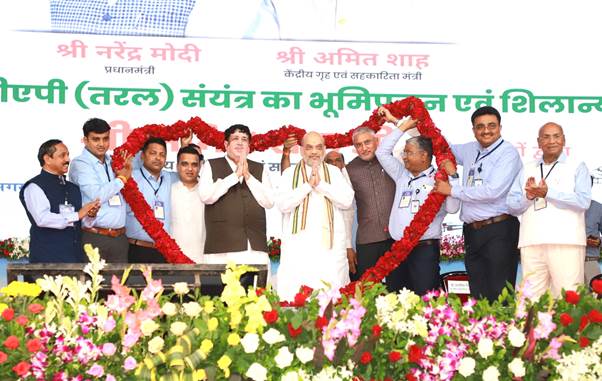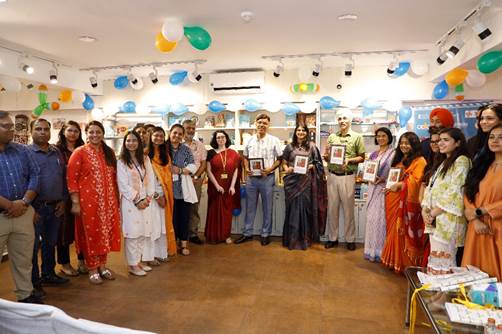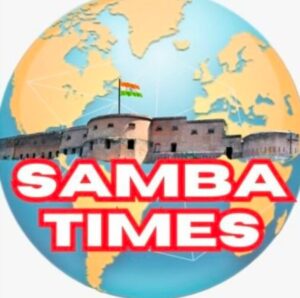PM inaugurates ‘Vanijya Bhawan’ and launches NIRYAT portal
“Country is moving in the direction of Citizen-Centric Governance”
“Dr Shyama Prasad Mukherjee’s policies, decisions, resolve, and their fulfilment were very important in giving direction to independent India”
“Ensuring ease of access for government and its facilities is a major priority”
“Taxpayer is respected only when projects and schemes are completed in stipulated time”
“Transformative progress has taken place in the country from the time of foundation stone laying to inauguration of Vanijya Bhawan”
“Exports play a key role in the transition of a country from developing to developed status”
The Prime Minister, Shri Narendra Modi inaugurated ‘Vanijya Bhawan’ and launched the NIRYAT portal in Delhi today. Union Ministers Shri Piyush Goyal, Shri Som Prakash and Smt Anupriya Patel were among those present on the occasion.
Addressing the gathering, the Prime Minister said today another important step has been taken in the direction of the journey of Citizen-Centric Governance in New India on which the country has been moving for the last 8 years. The country has got the gift of a new and modern commercial building as well as an export portal, one physical and other digital infrastructure, he said.
The Prime Minister noted that today is also the death anniversary of the country’s first Industries Minister Dr Shyama Prasad Mukherjee. “His policies, decisions, resolve, and their fulfilment were very important in giving direction to independent India. Today the country is paying its humble tribute to him”, he said.
Referring to the new infrastructure of the Ministry, the Prime Minister said that this is also time to renew the pledge of ease of doing business and through that ‘ease of living’ too. Ease of access, he said, is the link between the two. He said that there should not be any hindrances in communicating with the government and making the government accessible with ease is a major priority of the government. This vision is clearly reflected in the policies of the government, he added.
Referring to many examples of the recent past, the Prime Minister said that in the new work culture of the New India, completion date is part of SoP and is strictly adhered to. He remarked that only when the government’s projects do not hang for years and are completed on time, similarly, the government’s schemes reach their goals, then only, the taxpayer of the country is respected. Now we also have a modern platform in the form of the PM Gatishakti National Master Plan. He said that this Vanijya Bhawan will give a push to the nations ‘Gati Shakti’.
The Prime Minister cited the new Vanjiya Bhawan as also the symbol of his Government’s achievements in the field of commerce during this period. He recalled that at the time of foundation stone laying, he had stressed the need for innovation and improvement in the Global Innovation Index. Today, India is ranked 46th in the Global Innovation Index and is continuously improving. He had also talked about improving ease of doing business at that time , today, more than 32000 unnecessary compliances have been removed. Similarly, GST was new at the time of foundation stone laying of the building, today, 1 lakh crore GST collection per month has become commonplace. In terms of GeM, 9 thousand crore rupees worth orders were discussed then, today, more than 45 lakh small entrepreneurs are registered on the portal and orders worth more than 2.25 lakh crore have been placed. The Prime Minister had talked about 120 Mobile units at that time up from just 2 in 2014, today this number has crossed 200. Today India has 2300 registered Fin-tech startups, up from 500, 4 years ago. At the time of the foundation stone laying of the Vanijya Bhawan India used to recognize 8000 startups every year, today, this number is more than 15000, the Prime Minister informed.
The Prime Minister noted that last year, despite the historic global disruptions, India’s exports stood at a total of $ 670 billion i.e. Rs 50 lakh crore. Last year, the country had decided that despite every challenge, it has to cross the threshold of $ 400 billion i.e. 30 lakh crore merchandise export. We crossed this and created a new record of export of $ 418 billion i.e. 31 lakh crore rupees. “Encouraged by this success of the past years, we have now increased our export targets and have doubled our efforts to achieve them. Collective effort of everyone is very necessary to achieve these new goals”, he said, further adding that not only short term but long term targets should be set.
The Prime Minister said that NIRYAT – National Import-Export for Yearly Analysis of Trade portal will help in breaking silos by providing real time data to all stakeholders. “From this portal, important information related to more than 30 commodity groups exported to more than 200 countries of the world will be available. In the coming time, information related to district-wise exports will also be available on this. This will also strengthen the efforts to develop the districts as important centers of exports”, the Prime Minister said.
The Prime Minister underlined the role of increasing exports in the transition of a country from developing to developed country. The Prime Minister said that in the last eight years, India has also been continuously increasing its exports and achieving export goals. Better policies to increase exports, easing of the process, and taking products to new markets, have helped a lot. He said that today, every ministry, every department of the government is giving priority to increasing exports with a ‘whole of government’ approach. Be it the Ministry of MSME or Ministry of External Affairs, Agriculture or Commerce, all are making common efforts for a common goal. “Exports from new areas are increasing. Even from many aspirational districts, exports have now increased manifold. The increase in exports of cotton and handloom products by 55 per cent shows how the work is being done at the grassroot level”, he pointed out.
The Prime Minister said that the government’s emphasis on local products through the Vocal for Local campaign, ‘One district, one product’ scheme, has also helped in increasing exports. Now many of our products are being exported for the first time to new countries of the world. “Our Local is fast becoming Global”, he said citing examples like Sitabhog Mithai being exported to Bahrain, Fresh King Chilli of Nagaland to London, Fresh Burmese grapes of Assam to Dubai, tribal Mahua products from Chattisgarh to France and Khumani of Kargil to Dubai.
Reiterating the steps taken recently the Prime Minister said “We are also helping and emphasizing on GI tagging to connect our farmers, weavers and our traditional products with the export ecosystem.” He also referred to trade deals with UAE and Australia last year and informed that there has been a lot of progress with other countries as well. He praised the Indian diplomatic institutions abroad for working hard to convert a very challenging environment into opportunities for India. “For business, identifying new markets and manufacturing products after identifying their needs is very important for the progress of the country”, he said.
In conclusion, the Prime Minister requested every department to periodically review the portals and platforms that have been developed in recent times. “The goals with which we have developed these tools, how far they are being achieved and if there is a problem then efforts should be made for solving them.”

.jpeg)
INDIANNAVYPARTICIPATESINBILATERALNAVALMARITIMEPARTNERSHIPEXERCISEWITHUAENAVYQ0L1.jpeg)





